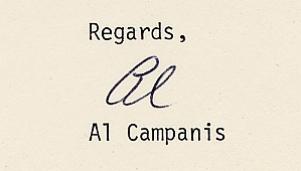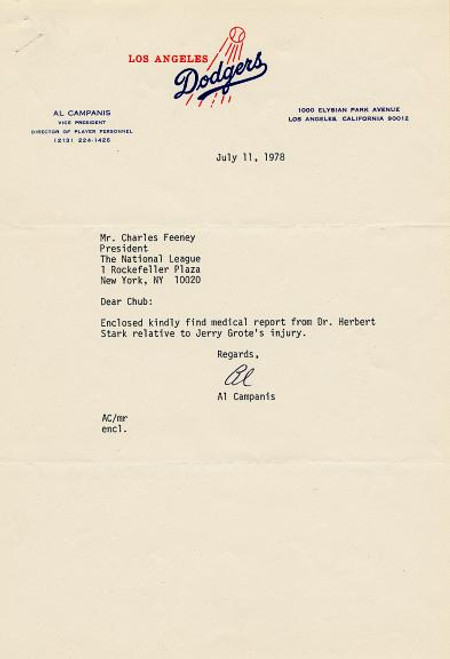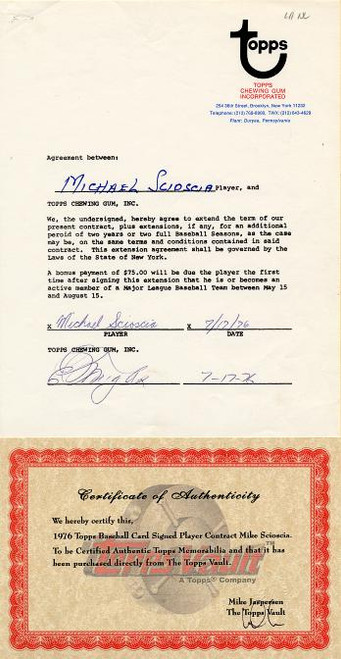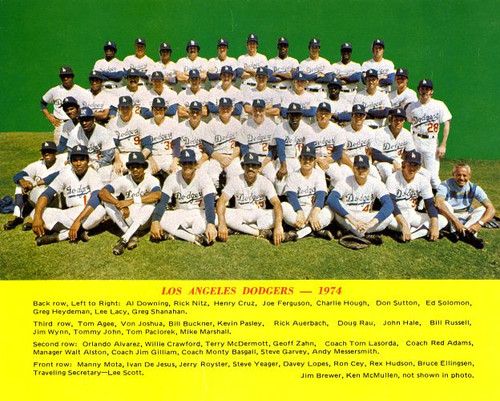Letter on Dodger letterhead from Al Campanis of the Los Angeles dated in 1978. The letter was send to Charles Feeney, President of the National League regarding Jerry Grote's injury. This letter is handsigned by Al Campanis, Vice-President and Director of Player Personnel of the Los Angeles Dodgers and is over 30 years old. 
Certificate Vignette Alexander Sebastian Campanis (November 2, 1916 - June 21, 1998) was an American executive in Major League Baseball. He had a brief Major League career as a second baseman, playing in seven games for the Brooklyn Dodgers in 1943. Campanis is most famous for his position as general manager of the Los Angeles Dodgers from 1968 to 1987, from which he was fired as a result of a high-profile incident in which he made racially insensitive remarks during a live interview on April 6, 1987. He is the only player in Major League history born in Kos. Kos is a Greek island in the Dodecanese, next to the Gulf of Cos. Controversy Campanis' infamous remarks took place on the late-night ABC News program Nightline, coinciding with the 40th anniversary of Jackie Robinson's Major League Baseball debut (April 15, 1947). Campanis, who had played alongside Robinson and was known for being close to him, was being interviewed about the subject. Nightline anchorman Ted Koppel asked him why, at the time, there had been few black managers and no black general managers in Major League Baseball. Campanis' reply was that blacks "may not have some of the necessities to be, let's say, a field manager, or, perhaps, a general manager" for these positions. Elsewhere in the interview he said that blacks are often poor swimmers "because they don't have the buoyancy." Koppel says he gave Campanis several opportunities to clarify ("Do you really believe that?") or back down on his remarks but Campanis confirmed his views with his replies. A protest erupted the next morning and he resigned two days later. The controversy was especially heated when it was pointed out that Campanis had participated in the decision over who would replace Walter Alston as the manager of the Dodgers. It had been a choice between the two coaches at the time, Tom Lasorda and Jim Gilliam, and it raised the question of whether Gilliam had been passed over because he was black. In an interview the next year, Campanis attempted to clarify that he was referring to the lack of African-Americans with experience in these areas, rather than their innate abilities. He also said that he was "wiped out" when the interview took place and therefore not entirely himself. Many other figures in baseball, such as fellow Dodgers manager Tom Lasorda and former Dodgers player Don Newcombe, have also spoken in Campanis' defense. Trivia In one of Campanis' first trades as general manager of the Dodgers, Campanis traded his own son, Jim Campanis to the Royals for two minor leaguers. In the book Baseball's Golden Greeks by Diamantis Zervos, Campanis' son, Jim, relates one of the big moments in his life which he called "a Greek moment in Cincinnati in 1967" when Jim was batting against the Reds, Alex Grammas was coaching third base, Chris Pelekoudas was umpiring behind the plate and the Reds' pitcher was Milt Pappas. Al Campanis was the scout who discovered future pitching great and Hall of Famer Sandy Koufax. History from Wikipedia and OldCompanyResearch.com (old stock certificate research service).
THE OBITUARY FOR AL CAMPANIS June 21st, 1998 Former Dodgers GM Al Campanis Dead at 81 04:08 am Eastern time, June 22 LOS ANGELES -- Al Campanis, who spent a half-century building championship teams for the Dodgers only to see his career unravel on national TV for saying blacks lacked ``the necessities'' to be baseball managers and executives, has died. He was 81. Campanis died Sunday of coronary artery disease at his Fullerton home, Orange County Supervising Deputy Coroner Rick McAnally said. He had diabetes and nearly died of pneumonia last year. The former Dodgers general manager who played in the minors with Jackie Robinson helped build teams that won four National League pennants and the 1981 World Series. ``He was just a great baseball man who loved the game, who obviously dedicated his life to the game,'' former Dodgers manager Bill Russell said Sunday. Russell was fired late Sunday along with longtime general manager Fred Claire. But Campanis was fired shortly after a 1987 interview on ABC's ``Nightline,'' an appearance that prompted a nationwide debate on race and sport. Campanis signed such black players as Hall of Famer Roberto Clemente and Tommy Davis. However, that was not enough to offset the damage from his comments on the eve of the baseball season 11 years ago. Campanis startled host Ted Koppel with his response to questions about continued prejudice in baseball. Campanis said blacks ``may not have some of the necessities to be, let's say, a field manager, or perhaps a general manager.'' Koppel gave Campanis a second chance to rephrase his thoughts, but Campanis made no retraction. In the same interview, Campanis suggested blacks were not good swimmers because they ``don't have the buoyancy.'' The next day Campanis apologized. The day after that he met with Dodgers president Peter O'Malley, and the team replaced him with Claire. ``I don't blame Peter for what he did,'' Campanis said. ``He had to do it.'' On Sunday, O'Malley said Campanis should be remembered for ``so much more in a distinguished career.'' ``Never before and never since have I believed that Al was a racist,'' O'Malley said. ``The record is there, going back to when he worked with Jackie Robinson on learning to make the double play, to his scouting in Latin America and to the signing of dozens of players of differing cultures. He was an extraordinary judge of talent and great teacher of the game.'' ``Dad didn't care if a player had green hair and a purple face if he could hit the ball or pitch it,'' his son, George, said. ``Everyone who knew him knew he didn't have a prejudiced bone in his body. It was not like he had been hiding anything. He just misused some words.'' Last year, former Dodgers manager Tom Lasorda, a longtime friend, called Campanis ``my mentor, who taught so much about the game of baseball and life.'' ``He did more for black players, more for Latin players, than anybody,'' said Lasorda, who will serve as interim general manager with Claire's firing. ``In all the years I've known him, I've never heard him say one racist thing, ever.'' Campanis ``was never a prejudiced man,'' another son, Jim, a former Dodgers player, told Los Angeles radio station KNX. In one of Campanis' first trades as general manager, he traded his son to Kansas City. Dodgers broadcaster Vin Scully, in Denver where the Dodgers finished a four-game series with Colorado, said he had known Campanis for 45 years. ``He didn't have a racist bone in his body,'' Scully said. Acting commissioner Bud Selig called Campanis ``a devoted baseball man who ... made a lot of contributions to baseball as well as the Dodgers.'' In a 1988 interview, Campanis tried to explain his ``Nightline'' comments. > ``When I said blacks lacked the `necessities' to be baseball managers or general managers, what I meant was the lack of necessary experience, not things like inherent intelligence or ability. > ``I was dead tired after traveling when I went on the show,'' he added. ``I got confused. It was like a telegram. You try to say it in a few words, and it's implied differently. ``I didn't want to go on. I was sitting in a seat in the empty Houston stadium, with a thing in my ear to hear the questions. I just wasn't myself. I got burned. I said things I didn't mean, explaining things I couldn't.'' Campanis had been invited on the show to talk about his old friend Robinson, who broke baseball's racial barrier in 1947. Author Roger Kahn was also a guest on ``Nightline.'' In a 1997 interview, he recalled Campanis' remarks. ``It was a mistake,'' he said. ``It was not an accident because I have heard similar things throughout all the years in baseball: `Sure, the blacks can run. Sure, the blacks can throw. And sure, the blacks can hit. But can they think?' And this kind of racism is endemic in baseball.'' Minorities made up just 2 percent of baseball front office employees before the Campanis controversy in 1987. Their percentage increased to 15 percent by 1989, when Bill White, a black, was appointed president of the National League. The gains have been minimal since. ``Time has diffused the immediate hurt of April 6,'' Campanis said in 1988. ``It has turned out to be a plus for baseball and myself.'' During his half century as player, scout, manager and executive in the Dodgers' organization, Campanis was considered anything but a racist. ``It was a very sad event for Al, it was a very difficult time,'' Claire said. ``His life was devoted to the game of baseball. This was a chapter he hoped wasn't there. It was there. With one glaring exception, he served baseball very well.'' During his tenure with the Dodgers, Campanis also signed Hall of Famer Sandy Koufax. ``He put some great teams together when he was general manager,'' Russell said. ``He was a guy that really knew the game, and obviously he played it. And he really was a good teacher, a great general manager.'' Campanis was the team's general manager from 1968-87. Before that, he was the scouting director. Under him, the Dodgers won the World Series in 1981, beating the New York Yankees in six games. The Dodgers lost the World Series in 1974, 1977 and 1978. Born in Greece, Campanis came to the United States at age 6. He graduated from New York University in 1940. In 1943, he played seven games for the Brooklyn Dodgers before serving in the Navy in World War II. Campanis is survived by sons Jim and George, five grandchildren and three great grandchildren. Services are pending.

Certificate Vignette
THE OBITUARY FOR AL CAMPANIS June 21st, 1998 Former Dodgers GM Al Campanis Dead at 81 04:08 am Eastern time, June 22 LOS ANGELES -- Al Campanis, who spent a half-century building championship teams for the Dodgers only to see his career unravel on national TV for saying blacks lacked ``the necessities'' to be baseball managers and executives, has died. He was 81. Campanis died Sunday of coronary artery disease at his Fullerton home, Orange County Supervising Deputy Coroner Rick McAnally said. He had diabetes and nearly died of pneumonia last year. The former Dodgers general manager who played in the minors with Jackie Robinson helped build teams that won four National League pennants and the 1981 World Series. ``He was just a great baseball man who loved the game, who obviously dedicated his life to the game,'' former Dodgers manager Bill Russell said Sunday. Russell was fired late Sunday along with longtime general manager Fred Claire. But Campanis was fired shortly after a 1987 interview on ABC's ``Nightline,'' an appearance that prompted a nationwide debate on race and sport. Campanis signed such black players as Hall of Famer Roberto Clemente and Tommy Davis. However, that was not enough to offset the damage from his comments on the eve of the baseball season 11 years ago. Campanis startled host Ted Koppel with his response to questions about continued prejudice in baseball. Campanis said blacks ``may not have some of the necessities to be, let's say, a field manager, or perhaps a general manager.'' Koppel gave Campanis a second chance to rephrase his thoughts, but Campanis made no retraction. In the same interview, Campanis suggested blacks were not good swimmers because they ``don't have the buoyancy.'' The next day Campanis apologized. The day after that he met with Dodgers president Peter O'Malley, and the team replaced him with Claire. ``I don't blame Peter for what he did,'' Campanis said. ``He had to do it.'' On Sunday, O'Malley said Campanis should be remembered for ``so much more in a distinguished career.'' ``Never before and never since have I believed that Al was a racist,'' O'Malley said. ``The record is there, going back to when he worked with Jackie Robinson on learning to make the double play, to his scouting in Latin America and to the signing of dozens of players of differing cultures. He was an extraordinary judge of talent and great teacher of the game.'' ``Dad didn't care if a player had green hair and a purple face if he could hit the ball or pitch it,'' his son, George, said. ``Everyone who knew him knew he didn't have a prejudiced bone in his body. It was not like he had been hiding anything. He just misused some words.'' Last year, former Dodgers manager Tom Lasorda, a longtime friend, called Campanis ``my mentor, who taught so much about the game of baseball and life.'' ``He did more for black players, more for Latin players, than anybody,'' said Lasorda, who will serve as interim general manager with Claire's firing. ``In all the years I've known him, I've never heard him say one racist thing, ever.'' Campanis ``was never a prejudiced man,'' another son, Jim, a former Dodgers player, told Los Angeles radio station KNX. In one of Campanis' first trades as general manager, he traded his son to Kansas City. Dodgers broadcaster Vin Scully, in Denver where the Dodgers finished a four-game series with Colorado, said he had known Campanis for 45 years. ``He didn't have a racist bone in his body,'' Scully said. Acting commissioner Bud Selig called Campanis ``a devoted baseball man who ... made a lot of contributions to baseball as well as the Dodgers.'' In a 1988 interview, Campanis tried to explain his ``Nightline'' comments. > ``When I said blacks lacked the `necessities' to be baseball managers or general managers, what I meant was the lack of necessary experience, not things like inherent intelligence or ability. > ``I was dead tired after traveling when I went on the show,'' he added. ``I got confused. It was like a telegram. You try to say it in a few words, and it's implied differently. ``I didn't want to go on. I was sitting in a seat in the empty Houston stadium, with a thing in my ear to hear the questions. I just wasn't myself. I got burned. I said things I didn't mean, explaining things I couldn't.'' Campanis had been invited on the show to talk about his old friend Robinson, who broke baseball's racial barrier in 1947. Author Roger Kahn was also a guest on ``Nightline.'' In a 1997 interview, he recalled Campanis' remarks. ``It was a mistake,'' he said. ``It was not an accident because I have heard similar things throughout all the years in baseball: `Sure, the blacks can run. Sure, the blacks can throw. And sure, the blacks can hit. But can they think?' And this kind of racism is endemic in baseball.'' Minorities made up just 2 percent of baseball front office employees before the Campanis controversy in 1987. Their percentage increased to 15 percent by 1989, when Bill White, a black, was appointed president of the National League. The gains have been minimal since. ``Time has diffused the immediate hurt of April 6,'' Campanis said in 1988. ``It has turned out to be a plus for baseball and myself.'' During his half century as player, scout, manager and executive in the Dodgers' organization, Campanis was considered anything but a racist. ``It was a very sad event for Al, it was a very difficult time,'' Claire said. ``His life was devoted to the game of baseball. This was a chapter he hoped wasn't there. It was there. With one glaring exception, he served baseball very well.'' During his tenure with the Dodgers, Campanis also signed Hall of Famer Sandy Koufax. ``He put some great teams together when he was general manager,'' Russell said. ``He was a guy that really knew the game, and obviously he played it. And he really was a good teacher, a great general manager.'' Campanis was the team's general manager from 1968-87. Before that, he was the scouting director. Under him, the Dodgers won the World Series in 1981, beating the New York Yankees in six games. The Dodgers lost the World Series in 1974, 1977 and 1978. Born in Greece, Campanis came to the United States at age 6. He graduated from New York University in 1940. In 1943, he played seven games for the Brooklyn Dodgers before serving in the Navy in World War II. Campanis is survived by sons Jim and George, five grandchildren and three great grandchildren. Services are pending.








